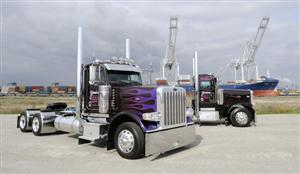COVER FEATURE - FEBRUARY 2011
HAULING FOR THE WORLD
YAMKO’S SWEET FLEET OF CONTAINER HAULERS
By Daniel J. Linss - Editor
Container haulers are not usually known for having cool trucks, but Yamko Truck Lines out of Long Beach, California is trying hard to break that stereotype. Yamko’s fleet of black cherry Peterbilts is not only attracting attention in the ports, but also at the truck shows. Most people find it hard to believe that these rigs actually yank containers all day – but they do. Specializing in harbor hauling and both importing and exporting for almost 50 years, Yamko has developed a good reputation for competence, excellence and lightning-fast service, and in the ever-changing business climate at the ports, that is not an easy thing to do.
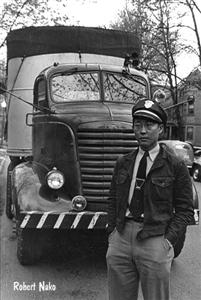 Back in the early 1960s, truck driver Robert Nako hung up his keys to become a freight broker in New York, wanting to start a business hauling fruits and vegetables between New York and California. So, in 1963, Robert moved his family to Santa Fe Springs, CA to facilitate this new venture but, unfortunately, it did not work out. Later that same year, Towne Distributing asked Mr. Nako to help them with their transportation. Robert had been raised in the Los Angeles area and was boyhood friends with Ronnie Sugiyama, Harry Yamamoto, and Kaz Furuto, the owners of Towne Distributing. Towne had just received a contract to distribute Schlitz beer out of the San Fernando Valley and they wanted Robert to handle the drayage (Mr. Nako did the drayage for Towne until the company was sold in 1985).
Back in the early 1960s, truck driver Robert Nako hung up his keys to become a freight broker in New York, wanting to start a business hauling fruits and vegetables between New York and California. So, in 1963, Robert moved his family to Santa Fe Springs, CA to facilitate this new venture but, unfortunately, it did not work out. Later that same year, Towne Distributing asked Mr. Nako to help them with their transportation. Robert had been raised in the Los Angeles area and was boyhood friends with Ronnie Sugiyama, Harry Yamamoto, and Kaz Furuto, the owners of Towne Distributing. Towne had just received a contract to distribute Schlitz beer out of the San Fernando Valley and they wanted Robert to handle the drayage (Mr. Nako did the drayage for Towne until the company was sold in 1985).
Yamko Truck Lines was first incorporated in February of 1964 as Yamashiro-Nako Enterprises, Inc. (the name was a compilation of the founder’s last names). Over the years, the company grew and acquired many new accounts – some of which they still have today. Over time, Robert began to work in and around the port, and eventually started hauling containers full time. In December of 1968, the corporation name was changed to Robert Nako Enterprises, Inc., DBA Yamko Truck Lines. In 1988, the company moved to Rancho Dominguez, CA where it rented spaces for its approximately ten trucks. About this time, Robert’s youngest daughter Debbie began working at the company. Mr. Nako ran the business until his semi-retirement in 1993, at which time Debbie took over, eventually becoming president of the company in 1995. Robert Nako died in 1996 and left the company to his daughter.
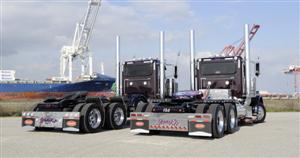 After having several office locations, Yamko finally settled on a four-acre piece of property in Long Beach, CA (where they still reside today). Debbie Nako continued to run the company until her untimely death from cancer in June of 2003. At that point, Frank Gomez, who had worked for Yamko for several years, took over the daily operations of running the company, which had about 15-20 trucks. Robert’s widow, Sarah Nako, who had never been very involved with the company, became the president.
After having several office locations, Yamko finally settled on a four-acre piece of property in Long Beach, CA (where they still reside today). Debbie Nako continued to run the company until her untimely death from cancer in June of 2003. At that point, Frank Gomez, who had worked for Yamko for several years, took over the daily operations of running the company, which had about 15-20 trucks. Robert’s widow, Sarah Nako, who had never been very involved with the company, became the president.
Frank Gomez (51) has worked in the transportation industry for most of his life. After eighteen years in the meat industry, managing a local company’s shipping/receiving department and driving, Frank went into business with a friend in 1996, purchasing four trucks and then putting them on at Yamko. Frank, who loved getting out of the office after all those years, drove a nice Peterbilt. After a few years, Frank broke that partnership but stayed on at Yamko. In 2003, after Debbie passed away, Frank was put in charge of the company, and in 2008 he became president, while Sarah Nako remained the owner. Running the company proved to be no easy task – Frank literally lived at the office during that first year – but he has since built the fleet up and made Yamko a well-oiled machine that keeps 50 trucks moving. For the last couple years, Frank has been training and grooming Sarah’s granddaughter Shannon Fetters (25) to eventually take over the company.
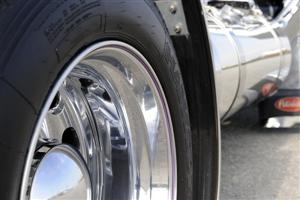 Today, in addition to hauling containers out of the ports, Yamko also picks up products and containers throughout California and prepares them for export to countries throughout the world (hence their slogan, “Hauling for the World”). Most of these products are fruits and vegetables, and Yamko handles all of the scheduling and logistics. Depending on the season, Yamko sends trucks to “coolers” in cities like Salinas, Yuma, Bakersfield, El Centro, Brawley and Santa Maria, and then prepares the containers
Today, in addition to hauling containers out of the ports, Yamko also picks up products and containers throughout California and prepares them for export to countries throughout the world (hence their slogan, “Hauling for the World”). Most of these products are fruits and vegetables, and Yamko handles all of the scheduling and logistics. Depending on the season, Yamko sends trucks to “coolers” in cities like Salinas, Yuma, Bakersfield, El Centro, Brawley and Santa Maria, and then prepares the containers
for shipment. Yamko does a lot of work for Matson, whose terminal is located in the Port of Long Beach, and Horizon Lines, based in the Port of Los Angeles. Yamko also prepares a lot of shipments of produce bound for Hawaii, and hauls several containers a day for Golden State Foods (McDonald’s).
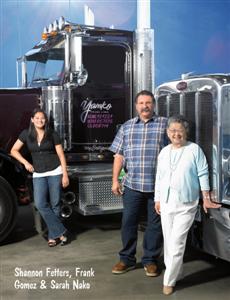 Most people in trucking are aware of the extreme regulations being implemented in most of the ports across the country – especially the ports of Long Beach and Los Angeles. These two Southern California ports, which operate independently but are located right next to each other in the San Pedro Bay, have recently adopted some of the toughest rules regarding the trucks that run in these areas. In an effort to reduce air pollution in and around the ports by 80%, the Clean Truck Program was enacted, which progressively bans all trucks that don’t meet certain emission requirements. Back in October 2008, all pre-1989 trucks were banned from entering the ports. As of January 1, 2010 all 1989-1993 trucks were banned from the ports, and all 1994-2003 trucks were required to be retrofitted with certain emission-related equipment. On January 1, 2012 all trucks that do not meet 2007 Federal Clean Truck Emissions Standards will be banned from the ports.
Most people in trucking are aware of the extreme regulations being implemented in most of the ports across the country – especially the ports of Long Beach and Los Angeles. These two Southern California ports, which operate independently but are located right next to each other in the San Pedro Bay, have recently adopted some of the toughest rules regarding the trucks that run in these areas. In an effort to reduce air pollution in and around the ports by 80%, the Clean Truck Program was enacted, which progressively bans all trucks that don’t meet certain emission requirements. Back in October 2008, all pre-1989 trucks were banned from entering the ports. As of January 1, 2010 all 1989-1993 trucks were banned from the ports, and all 1994-2003 trucks were required to be retrofitted with certain emission-related equipment. On January 1, 2012 all trucks that do not meet 2007 Federal Clean Truck Emissions Standards will be banned from the ports.
To accommodate these new regulations, Yamko began buying new “clean” trucks a few years ago, and helped many of their leased owner operators get into newer trucks that had been (or could be) retrofitted to comply. Their current company-owned fleet consists of five beautiful black cherry Peterbilts, all similar to the ones seen on our cover and centerfold this month, as well as on these pages here. Yamko also has about 45 owner operators, and the company makes sure that their rigs are also well-maintained and uphold the high standards that Yamko has established over the decades. In the office, a team of six girls handle all of the daunting paperwork associated with trucking, import/export and dealing with the ports. Since Yamko takes such very good care of all their employees and drivers, the company has an extremely low turn-over rate. Yamko’s owner operators enjoy having a nice yard to park in, on-site mechanics and detailers, and plenty of work, while their company drivers enjoy running great equipment, fair pay and flexible hours.
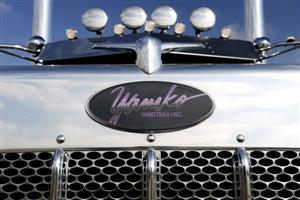 John Gonzales (52) came to Yamko in 2008 as a driver, but was quickly moved into the fleet manager position after the company purchased their five new “port-friendly” Peterbilts. Aside from a few years playing semi-professional baseball (a shoulder injury ended that career early), John has been driving his entire life – and in that time, he has only had three jobs. His first gig was working for an off-road racing team, driving their hauler, for 15 years. After that, he went to work for Regan Distributing out of Santa Ana, CA, hauling nothing but produce for 17 years. Since becoming the fleet manager at Yamko, John only gets to drive a few times a week, but when he does, he rides in style.
John Gonzales (52) came to Yamko in 2008 as a driver, but was quickly moved into the fleet manager position after the company purchased their five new “port-friendly” Peterbilts. Aside from a few years playing semi-professional baseball (a shoulder injury ended that career early), John has been driving his entire life – and in that time, he has only had three jobs. His first gig was working for an off-road racing team, driving their hauler, for 15 years. After that, he went to work for Regan Distributing out of Santa Ana, CA, hauling nothing but produce for 17 years. Since becoming the fleet manager at Yamko, John only gets to drive a few times a week, but when he does, he rides in style.
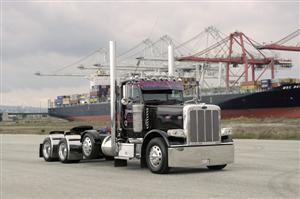 John’s company truck (#136) is the flagship of the fleet. All of the Yamko company trucks are painted black cherry with black fenders and have fuschia and violet pinstripes and lettering, but John’s rig is the only one with metallic flames on the hood. The truck is a 2009 Peterbilt 388 with a 245-inch wheelbase, a 485 Cummins ISX and a 13-speed transmission. Featuring plenty of “old school” pinstripes and lots of chrome, the truck has two extra horns on the roof (four in total), a 22-inch tapered bumper, 4-inch cab extensions, a set of stainless quarter fenders on each of the two rear axles, custom tank bracket covers from Aranda Truck Accessories (ATA), extra grille bars and many LED lights. The “Big Dog” also has new 8-inch pipes from Dynaflex made to handle the extreme heat and other issues created by the truck’s diesel particulate filter (DPF). Inside the front fenders, behind the tires, is a stainless steel piece with three small LED lights which create a neat glow in the wheel wells at night. Also, each of the truck’s wheels feature a fuschia and violet pinstripe painted around the outer edge. The interior is adorned with wood pieces made by Rockwood, including a special Rosewood headliner panel on the ceiling, a chrome steering column, billet door jam plates and a big stereo with a subwoofer.
John’s company truck (#136) is the flagship of the fleet. All of the Yamko company trucks are painted black cherry with black fenders and have fuschia and violet pinstripes and lettering, but John’s rig is the only one with metallic flames on the hood. The truck is a 2009 Peterbilt 388 with a 245-inch wheelbase, a 485 Cummins ISX and a 13-speed transmission. Featuring plenty of “old school” pinstripes and lots of chrome, the truck has two extra horns on the roof (four in total), a 22-inch tapered bumper, 4-inch cab extensions, a set of stainless quarter fenders on each of the two rear axles, custom tank bracket covers from Aranda Truck Accessories (ATA), extra grille bars and many LED lights. The “Big Dog” also has new 8-inch pipes from Dynaflex made to handle the extreme heat and other issues created by the truck’s diesel particulate filter (DPF). Inside the front fenders, behind the tires, is a stainless steel piece with three small LED lights which create a neat glow in the wheel wells at night. Also, each of the truck’s wheels feature a fuschia and violet pinstripe painted around the outer edge. The interior is adorned with wood pieces made by Rockwood, including a special Rosewood headliner panel on the ceiling, a chrome steering column, billet door jam plates and a big stereo with a subwoofer.
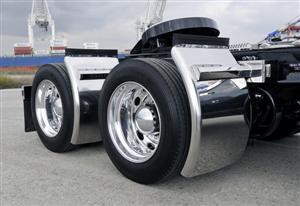 The second company truck (#139) seen here and on the centerfold, is a 2010 Peterbilt 388 with the same basic powertrain as John’s rig. Driven by Juan “JC” Carlos (32), this truck has a 248-inch wheelbase and an extra drop-axle to handle heavier loads. Another unique feature on this truck is the painted front and side visors, featuring skulls and pinstripes. It has also been fitted with many of the same accessories John’s truck has including a 22-inch tapered bumper, two extra horns on the roof, LED lights by Trux, 8-inch Dynaflex exhaust, painted cab skirts, a stainless rear light bar and pinstriped wheels. This rig also has a custom painted deck plate, a painted shock box and polished side boxes from ATA, bullet lights with clear lenses atop the cab, different custom tank bracket covers made by ATA and a TV that folds down from the ceiling inside the truck. All of the chrome and extra accessories that Yamko buys comes from Harbor Truck Supply in Long Beach. Whatever John wants or needs, they always take good care of him. Frank says that he will continue to buy chrome for the company trucks, as long as the drivers continue to take good care of them.
The second company truck (#139) seen here and on the centerfold, is a 2010 Peterbilt 388 with the same basic powertrain as John’s rig. Driven by Juan “JC” Carlos (32), this truck has a 248-inch wheelbase and an extra drop-axle to handle heavier loads. Another unique feature on this truck is the painted front and side visors, featuring skulls and pinstripes. It has also been fitted with many of the same accessories John’s truck has including a 22-inch tapered bumper, two extra horns on the roof, LED lights by Trux, 8-inch Dynaflex exhaust, painted cab skirts, a stainless rear light bar and pinstriped wheels. This rig also has a custom painted deck plate, a painted shock box and polished side boxes from ATA, bullet lights with clear lenses atop the cab, different custom tank bracket covers made by ATA and a TV that folds down from the ceiling inside the truck. All of the chrome and extra accessories that Yamko buys comes from Harbor Truck Supply in Long Beach. Whatever John wants or needs, they always take good care of him. Frank says that he will continue to buy chrome for the company trucks, as long as the drivers continue to take good care of them.
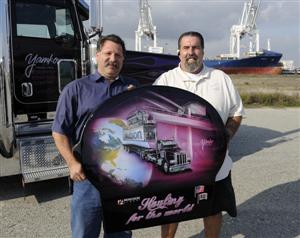 Yamko began taking their trucks to local shows about two years ago and have seen great success. At each event, they try to raise the level of competition by doing more to their trucks. Yamko has a third truck that they take to many of the shows, with a sleeper, driven by Armando Burgua, that is usually hooked to a matching, custom-painted container chassis complete with murals on the sides of the rails. Sarah, at 84 years old, loves going to the shows – especially the one in Las Vegas – and loves to walk around and grab all the free giveaways from the vendors. We are hoping that we can convince Frank to allow some of his trucks to travel to the show in Louisville, KY this March and compete. California trucks are always a huge hit at that show!
Yamko began taking their trucks to local shows about two years ago and have seen great success. At each event, they try to raise the level of competition by doing more to their trucks. Yamko has a third truck that they take to many of the shows, with a sleeper, driven by Armando Burgua, that is usually hooked to a matching, custom-painted container chassis complete with murals on the sides of the rails. Sarah, at 84 years old, loves going to the shows – especially the one in Las Vegas – and loves to walk around and grab all the free giveaways from the vendors. We are hoping that we can convince Frank to allow some of his trucks to travel to the show in Louisville, KY this March and compete. California trucks are always a huge hit at that show!
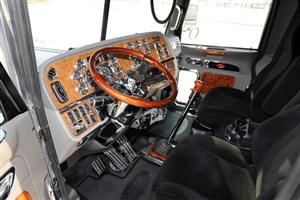 We took our pictures of the Yamko trucks down in the port, near a container terminal, where these trucks spend most of their time. While doing a little research about the port for this article, we realized that the Port of Long Beach was about to celebrate its 100th anniversary. The Port of Long Beach, a wild dream scratched out of 800 acres of mud flats at the mouth of the Los Angeles River, was founded on June 24, 1911. In the ten decades since then, the port has expanded to include more than 7,600 acres of wharves, cargo terminals, roadways, rail yards and shipping channels. Today, the Port of Long Beach is the second busiest seaport in the United States, and, when combined with its neighbor, the Port of Los Angeles (the busiest seaport in the United States), it is the fifth largest shipping complex in the world.
We took our pictures of the Yamko trucks down in the port, near a container terminal, where these trucks spend most of their time. While doing a little research about the port for this article, we realized that the Port of Long Beach was about to celebrate its 100th anniversary. The Port of Long Beach, a wild dream scratched out of 800 acres of mud flats at the mouth of the Los Angeles River, was founded on June 24, 1911. In the ten decades since then, the port has expanded to include more than 7,600 acres of wharves, cargo terminals, roadways, rail yards and shipping channels. Today, the Port of Long Beach is the second busiest seaport in the United States, and, when combined with its neighbor, the Port of Los Angeles (the busiest seaport in the United States), it is the fifth largest shipping complex in the world.
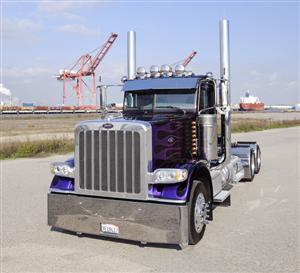 The Port of Long Beach provides shipping terminals for nearly one-third of the waterborne freight moving through the West Coast, and handles more than $160 billion worth of goods annually. The port is also a huge economic engine, supporting 30,000 jobs in Long Beach, 316,000 jobs throughout Southern California and 1.4 million jobs across the country. Recent reports are indicating that container shipments that passed through the Port of Long Beach in 2010 rose by 24%, the largest gain since 1971, and the overall container volume increased by 1.2 million units. Maybe this lousy economy is finally starting to show signs of improvement!
The Port of Long Beach provides shipping terminals for nearly one-third of the waterborne freight moving through the West Coast, and handles more than $160 billion worth of goods annually. The port is also a huge economic engine, supporting 30,000 jobs in Long Beach, 316,000 jobs throughout Southern California and 1.4 million jobs across the country. Recent reports are indicating that container shipments that passed through the Port of Long Beach in 2010 rose by 24%, the largest gain since 1971, and the overall container volume increased by 1.2 million units. Maybe this lousy economy is finally starting to show signs of improvement!
Port haulers are forced to deal with many challenges that most “normal” truckers do not have to face, and many have not been able to survive the suffocating regulations imposed on them – especially the smaller companies. Frank has no plans to make the company any larger, and he, like most port haulers, are just waiting to see what the future holds for their industry. But in the meantime, Yamko Truck Lines continues to press on, helping to build a better reputation for all of the port haulers out there who are “hauling for the world” like themselves.
